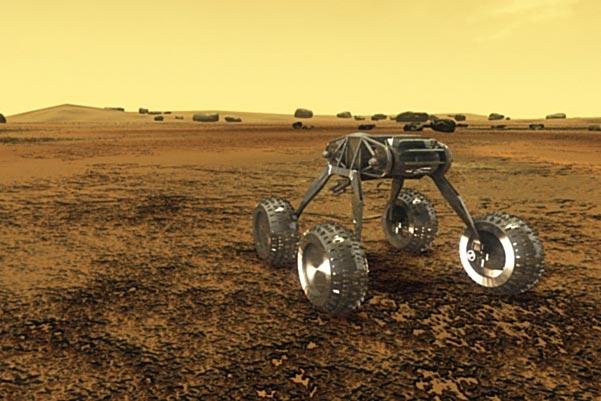 |
This is a file from the Wikimedia Commons. Information from its description page there is shown below.
Commons is a freely licensed media file repository. You can help.
|
Summary
A rover that could survive the intense heat of Venus, seen here in an artist's impression, could revolutionise our understanding of the planet.
Cooled by a Stirling Cooler with electronics at 200 °C and external radiator at 500 °C. Since the Venusian atmosphere is 'only' 450 °C the radiator will lose energy.
Geoffrey Landis and Kenneth Mellott from NASA's Glenn Research Centre in Ohio.hathshstrh
Licensing
| Public domainPublic domainfalsefalse |
 |
This file is in the public domain because it was solely created by NASA. NASA copyright policy states that "NASA material is not protected by copyright unless noted". (See Template:PD-USGov, NASA copyright policy page or JPL Image Use Policy.) |
|
|
|
Warnings:
- Use of NASA logos, insignia and emblems are restricted per US law 14 CFR 1221.
- The NASA website hosts a large number of images from the Soviet/ Russian space agency, and other non-American space agencies. These are not necessarily in the public domain.
- Materials based on Hubble Space Telescope data may be copyrighted if they are not explicitly produced by the STScI. See also {{ PD-Hubble}} and {{ Cc-Hubble}}.
- The SOHO (ESA & NASA) joint project implies that all materials created by its probe are copyrighted and require permission for commercial non-educational use.
- Images featured on the Astronomy Picture of the Day (APOD) web site may be copyrighted.
|
File usage
The following pages on Schools Wikipedia link to this image (list may be incomplete):
You can learn about nearly 6,000 different topics on Schools Wikipedia. The world's largest orphan charity, SOS Children's Villages brings a better life to more than 2 million people in 133 countries around the globe. Find out how you can help children in other countries.





